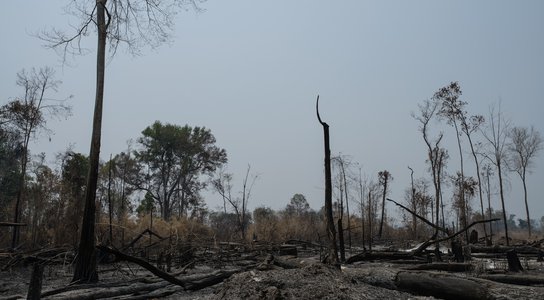Rainforests the size of Belgium deforested in a single year. Two football pitches of Brazilian Amazon destroyed every minute. Hundreds of land and environmental defenders killed and cleared from their land to make way for agribusiness, mining and logging. A growing swell of political and public anger against climate breakdown and environmental devastation.
Guidelines and voluntary approaches in the European Union are failing to prevent environmental destruction at scale. The time has come for the EU to establish mandatory due diligence for companies that are based in the continent, or which provide goods or services to its people.
Read
our joint briefing with ClientEarth now: Strengthening corporate responsibility: the case for mandatory due diligence in the EU to protect people and the planet (PDF, 6.3MB)
In a globalised world, consumption and investment can drive and accelerate environmental destruction in some of our most precious and fragile landscapes, sometimes thousands of miles away. The EU is a stark example of this: its imports have been found to be responsible for over a third of all deforestation – in other words, 30% of global forest destruction is linked to crop and livestock products traded between regions.
What is the problem?
The world’s tropical forests are our front-line defence against climate change. But at times, the pursuit of profit by businesses that operate within the EU has made environmental and human rights concerns peripheral to commercial interests – and our vital forests are disappearing fast as a result.
It is no longer possible to ignore the urgency of the current climate breakdown, the destruction of biodiversity and vital ecosystems, the harm caused to local communities and indigenous peoples, and the role of European consumption and financial systems helping drive this this crisis.
As the race for land grows, the intertwining of environmental damage and human rights abuses grows ever stronger. This intertwining is seen both in the short term – with violent land grabs used to deforest a piece of land for industrial projects – and the long term, with drought destroying farms and forcing the displacement of families across continents.
What must the EU do?
Guidelines and voluntary approaches are failing to prevent environmental destruction at scale. It is now critical that the EU establishes mandatory due diligence for companies that are EU-based or that provide goods or services in the EU.
These companies, importantly, include financiers and investors, who wield a huge amount of power in facilitating and encouraging projects that can have large environmental and human rights impacts. Mandatory due diligence should be used by all these actors to identify, prevent, mitigate and account for their risks and impacts on the environment, human rights and governance[1].
The long-awaited publication of the EU’s communication on deforestation provides an opportunity for the EU to show global leadership by taking concrete action to tackle deforestation, environmental harm and human rights abuses through the introduction of mandatory due diligence across sectors, supply chains and investments for EU-based companies and those providing goods and services in the EU.
The EU should also take measures to support producers in developing countries to improve their environmental standards and human rights practices, and to improve livelihoods.
Effective due diligence is in the interest of companies themselves as environmental and human rights considerations can entail significant material risks. These can include operational blockages, as well as reputational, financial and legal risks[2].
Legislation requiring companies to identify, prevent and mitigate environmental damage and human rights abuses can help them manage these risks and provide a level playing field for companies. It would also help investors fulfil their new obligations under the EU Investor Disclosure
Regulation as they will need to assess the relevant environmental, social and governance information of the companies they invest in.
Mandatory due diligence and associated disclosure requirements for companies would create a coherent and coordinated framework.
EU due diligence legislation would also benefit the private sector operating in more than one Member State by providing a common set of criteria, and help the EU to meet its international commitments particularly concerning the 2030 Agenda for Sustainable Development and the Paris Climate Agreement.
What does our briefing outline?
This briefing sets out the key components of due diligence legislation requiring companies to conduct checks on their investments and supply chains to identify, prevent and mitigate environmental, social and governance risks and impacts within and outside the EU.
We draw on lessons from Global Witness and ClientEarth’s combined experience of due diligence in operation across a range of sectors. It aims to inform discussions amongst policy makers, and encourage a more rigorous and consistent approach to checks on Europe’s business practices, imports, production and investments.
We are looking at the particular case for due diligence in relation to deforestation risks, but we believe that due diligence should apply across all sectors, supply and investment chains and encompass environmental, human rights and governance risks and impacts.
Read
our joint briefing with ClientEarth now: Strengthening corporate responsibility: the case for mandatory due diligence in the EU to protect people and the planet (PDF, 6.3MB)
[1] These environment, social and governance risks as commonly referred to as ESG. The Principles for Responsible Investment website notes ‘examples of ESG factors are numerous and ever-shifting’, they are also linked to the unique exposure of specific sectors or business. Analysts such as RepRisk can include dozens of different thematic issues in their analysis. PRI lists some examples of ESG factors, including: ‘Environmental: climate change - including physical risk and transition risk); resource depletion, including water; waste and pollution; deforestation, Social: working conditions, including slavery and child labour; local communities, including indigenous communities, conflict, health and safety; employee relations and diversity, Governance: executive pay; bribery and corruption; political lobbying and donations; board diversity and structure; tax strategy’. PRI, What is responsible investment? https://www.unpri.org/pri/what-is-responsible-investment
[2] Climate Advisers and Ceres, Case StudySeries: Business Risks from Deforestation, November 2017. Chain Reaction Research, The Chain: Deforestation as a climate risk for investors, June2019.
Contacts
You might also like
-
Briefing EU investor due diligence
It is crucial to ensure finance works for people and planet
-
Campaign Forests
Irresponsible businesses including financial institutions are driving the destruction of climate-critical tropical forests, and the communities and biodiversity that rely on them.
-
Blog post EU must tackle deforestation linked to imports of agricultural commodities
On the International Day of Forests Global Witness calls on the EU to finally deliver on its commitments to halt deforestation